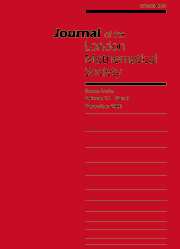Crossref Citations
This article has been cited by the following publications. This list is generated based on data provided by
Crossref.
Friedlander, John
and
Shparlinski, Igor
2000.
On the distribution of the power generator.
Mathematics of Computation,
Vol. 70,
Issue. 236,
p.
1575.
Canetti, Ran
Friedlander, John
Konyagin, Sergei
Larsen, Michael
Lieman, Daniel
and
Shparlinski, Igor
2000.
On the statistical properties of Diffie-Hellman distributions.
Israel Journal of Mathematics,
Vol. 120,
Issue. 1,
p.
23.
Friedlander, John B.
Hansen, Jan
and
Shparlinski, Igor E.
2000.
Character sums with exponential functions.
Mathematika,
Vol. 47,
Issue. 1-2,
p.
75.
Friedlander, John B.
and
Shparlinski, Igor E.
2001.
On the Distribution of Diffie--Hellman Triples with Sparse Exponents.
SIAM Journal on Discrete Mathematics,
Vol. 14,
Issue. 2,
p.
162.
Shparlinski, Igor E.
2002.
On the Distribution of the Diffie–Hellman Pairs.
Finite Fields and Their Applications,
Vol. 8,
Issue. 2,
p.
131.
Blake, Ian F.
and
Garefalakis, Theo
2004.
On the complexity of the discrete logarithm and Diffie–Hellman problems.
Journal of Complexity,
Vol. 20,
Issue. 2-3,
p.
148.
Shparlinski, Igor E.
2004.
Exponential Function Analogue of Kloosterman Sums.
Rocky Mountain Journal of Mathematics,
Vol. 34,
Issue. 4,
Friedlander, John B.
2006.
Equidistribution in Number Theory, An Introduction.
Vol. 237,
Issue. ,
p.
29.
Fouque, Pierre-Alain
Pointcheval, David
Stern, Jacques
and
Zimmer, Sébastien
2006.
Automata, Languages and Programming.
Vol. 4052,
Issue. ,
p.
240.
Laskari, E.C.
Meletiou, G.C.
Tasoulis, D.K.
and
Vrahatis, M.N.
2006.
Studying the performance of artificial neural networks on problems related to cryptography.
Nonlinear Analysis: Real World Applications,
Vol. 7,
Issue. 5,
p.
937.
Jao, David
Jetchev, Dimitar
and
Venkatesan, Ramarathnam
2007.
Progress in Cryptology – INDOCRYPT 2007.
Vol. 4859,
Issue. ,
p.
33.
Fouque, Pierre-Alain
Pointcheval, David
and
Zimmer, Sébastien
2008.
HMAC is a randomness extractor and applications to TLS.
p.
21.
Bourgain, Jean
Cochrane, Todd
Paulhus, Jennifer
and
Pinner, Christopher
2009.
Decimations of $\ell$-Sequences and Permutations of Even Residues $\modp$.
SIAM Journal on Discrete Mathematics,
Vol. 23,
Issue. 2,
p.
842.
Гараев, Мубарис Зафар оглы
and
Garaev, Mubaris Zafar ogly
2010.
Суммы и произведения множеств и оценки рациональных тригонометрических сумм в полях простого порядка.
Успехи математических наук,
Vol. 65,
Issue. 4,
p.
5.
2013.
Handbook of Finite Fields.
p.
777.
Ostafe, Alina
Shparlinski, Igor E
and
Voloch, José Felipe
2023.
Equations and Character Sums with Matrix Powers, Kloosterman Sums over Small Subgroups, and Quantum Ergodicity.
International Mathematics Research Notices,
Vol. 2023,
Issue. 16,
p.
14196.




